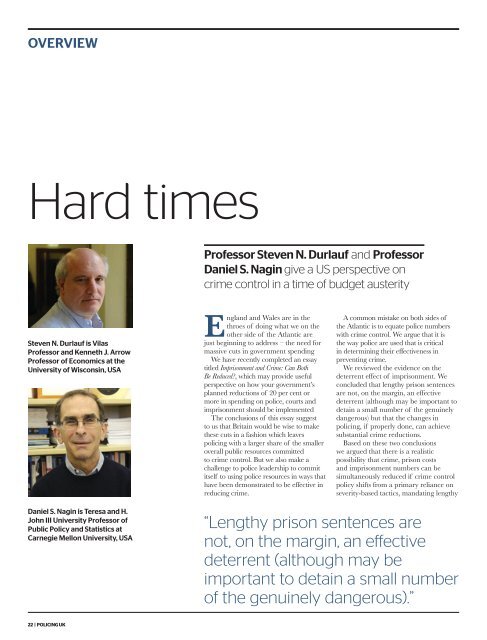Policing UK 2013 - Police Federation
Policing UK 2013 - Police Federation
Policing UK 2013 - Police Federation
Create successful ePaper yourself
Turn your PDF publications into a flip-book with our unique Google optimized e-Paper software.
OVERVIEW<br />
Hard times<br />
Professor Steven N. Durlauf and Professor<br />
Daniel S. Nagin give a US perspective on<br />
crime control in a time of budget austerity<br />
Steven N. Durlauf is Vilas<br />
Professor and Kenneth J. Arrow<br />
Professor of Economics at the<br />
University of Wisconsin, USA<br />
England and Wales are in the<br />
throes of doing what we on the<br />
other side of the Atlantic are<br />
just beginning to address – the need for<br />
massive cuts in government spending<br />
We have recently completed an essay<br />
titled Imprisonment and Crime: Can Both<br />
Be Reduced?, which may provide useful<br />
perspective on how your government’s<br />
planned reductions of 20 per cent or<br />
more in spending on police, courts and<br />
imprisonment should be implemented<br />
The conclusions of this essay suggest<br />
to us that Britain would be wise to make<br />
these cuts in a fashion which leaves<br />
policing with a larger share of the smaller<br />
overall public resources committed<br />
to crime control. But we also make a<br />
challenge to police leadership to commit<br />
itself to using police resources in ways that<br />
have been demonstrated to be effective in<br />
reducing crime.<br />
A common mistake on both sides of<br />
the Atlantic is to equate police numbers<br />
with crime control. We argue that it is<br />
the way police are used that is critical<br />
in determining their effectiveness in<br />
preventing crime.<br />
We reviewed the evidence on the<br />
deterrent effect of imprisonment. We<br />
concluded that lengthy prison sentences<br />
are not, on the margin, an effective<br />
deterrent (although may be important to<br />
detain a small number of the genuinely<br />
dangerous) but that the changes in<br />
policing, if properly done, can achieve<br />
substantial crime reductions.<br />
Based on these two conclusions<br />
we argued that there is a realistic<br />
possibility that crime, prison costs<br />
and imprisonment numbers can be<br />
simultaneously reduced if crime control<br />
policy shifts from a primary reliance on<br />
severity-based tactics, mandating lengthy<br />
Daniel S. Nagin is Teresa and H.<br />
John III University Professor of<br />
Public Policy and Statistics at<br />
Carnegie Mellon University, USA<br />
“Lengthy prison sentences are<br />
not, on the margin, an effective<br />
deterrent (although may be<br />
important to detain a small number<br />
of the genuinely dangerous).”<br />
22 | POLICING <strong>UK</strong>
















